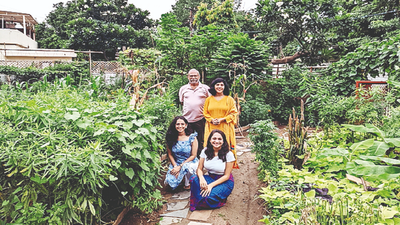Top Searches
- News
- City News
- vadodara News
- Pandemic pushed this Barodian family to grow food forest inside concrete jungle
Pandemic pushed this Barodian family to grow food forest inside concrete jungle

Rastogi family at their garden, named Savitri urban food forest
VADODARA: Imagine a dense forest with green trees, many of them bearing fruits, located right in the heart of the city. Unbelievable? Well, a family of four has converted an urban plot that was otherwise a barren land lying vacant surrounded by concrete jungles into an urban food forest.
It was in January 2021 during the Covid-19 pandemic that this family experiencing the need to be close to nature had started the journey of raising something as beautiful as a food forest, a green space in the middle of Vadodara city. Named as Savitri urban food forest, it has now turned into an eco-education space.
“During the pandemic, we as a family experienced the need to be close to nature and strived to create a forest-like green space in the middle of the city,” said Rajasi Rastogi, who along her mother Reena Raj Rastogi, had started working on the project.
“My mother is very passionate about urban farming, green spaces and food growing. With the intention to convert a barren land into an urban forest, we have started this project. We did not want to develop this space into a commercial farm but more of a model to showcase how even a small space can be converted into an urban food forest,” she said.
“With our shared passions across design and farming, we converted this empty private plot spread on 10,000 square feet into an urban food forest using minimal inputs and resources. We witnessed the transformation of a barren land into a green space that invites various birds, butterflies, and insects into our home,” she said.
The forest at Kunj Society is home to different types of seasonal vegetables, 100-plus varieties of plant species, and many fruit plants. “Food forests are based on the concept of ‘permaculture’ that tries to recreate a forest-like ecosystem in a small space. Such living and breathing forests bring healthy soil, cooler temperatures and organic produce without intensive energy and capital input,” she said.
“All elements at Savitri have been designed using locally sourced scrap from factories such as old tires, wooden pallets and electrical spools. Even our pathways were built utilising our plot’s old construction debris, broken bricks, stones, and tiles,” she said, adding that the concept was to create beautiful and functional spaces using most basic materials.
In the last couple of months, this urban food forest has seen visits of kids from different schools, small music performances and informal gathering of people who come here to meditate.
“We are also trying to experiment with few other programmes. Our focus is on eco-education,” said Rajasi, who after completing her bachelors in product design from University of Illinois, is currently pursuing masters in social innovation from Cambridge University.
It was in January 2021 during the Covid-19 pandemic that this family experiencing the need to be close to nature had started the journey of raising something as beautiful as a food forest, a green space in the middle of Vadodara city. Named as Savitri urban food forest, it has now turned into an eco-education space.
“During the pandemic, we as a family experienced the need to be close to nature and strived to create a forest-like green space in the middle of the city,” said Rajasi Rastogi, who along her mother Reena Raj Rastogi, had started working on the project.
“My mother is very passionate about urban farming, green spaces and food growing. With the intention to convert a barren land into an urban forest, we have started this project. We did not want to develop this space into a commercial farm but more of a model to showcase how even a small space can be converted into an urban food forest,” she said.
“With our shared passions across design and farming, we converted this empty private plot spread on 10,000 square feet into an urban food forest using minimal inputs and resources. We witnessed the transformation of a barren land into a green space that invites various birds, butterflies, and insects into our home,” she said.
The forest at Kunj Society is home to different types of seasonal vegetables, 100-plus varieties of plant species, and many fruit plants. “Food forests are based on the concept of ‘permaculture’ that tries to recreate a forest-like ecosystem in a small space. Such living and breathing forests bring healthy soil, cooler temperatures and organic produce without intensive energy and capital input,” she said.
“All elements at Savitri have been designed using locally sourced scrap from factories such as old tires, wooden pallets and electrical spools. Even our pathways were built utilising our plot’s old construction debris, broken bricks, stones, and tiles,” she said, adding that the concept was to create beautiful and functional spaces using most basic materials.
In the last couple of months, this urban food forest has seen visits of kids from different schools, small music performances and informal gathering of people who come here to meditate.
“We are also trying to experiment with few other programmes. Our focus is on eco-education,” said Rajasi, who after completing her bachelors in product design from University of Illinois, is currently pursuing masters in social innovation from Cambridge University.
FOLLOW US ON SOCIAL MEDIA
FacebookTwitterInstagramKOO APPYOUTUBE
Start a Conversation









